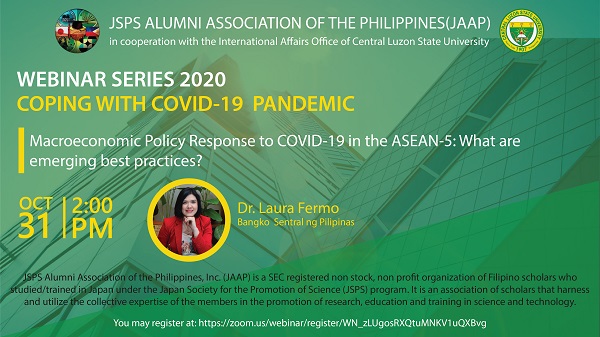2020年10月31日(土)、JSPSフィリピン同窓会(JAAP)がWeb Lectureを開催しました。
このWeb Lectureは、WEBINAR SERIES 2020 “COPING WITH COVID-19 PANDEMIC”の第3回目で、今回もセントラル・ルザン州立大学(Central Luzon State University)国際室の協力を得て行いました。
JAAPのDr. Renato G. Reyes会長(Vice President for Academic Affairs, Central Luzon State University)、JSPSバンコク研究連絡センターの大谷センター長の挨拶の後、Dr. Laula Fermo(Bangko Sentral ng Pilipinas)が“Macroeconomic Policy Response to Covid-19 in ASEAN-5: What are emerging best practices?”の講演を行いました。
このWeb Lectureへの参加者は約380名でした。講演終了後は多くの質問が寄せられ、講演者は丁寧に質問に答えていました。
最後に、JAAP副会長のDr. Danilda H. Duran氏から挨拶があり、盛会のうちにWeb Lectureは終了しました。
Abstract of the Lecture
Preventing the spread of COVID-19 has a lot to do with pre-COVID conditions. Higher income countries’ financial response and state and quality of public health capabilities–in terms of spending on research and health needs and both fiscal and monetary stimulus alike—were comparatively larger than in emerging Asian countries, including the ASEAN-5. But income levels and the state of public health of a country is a necessary but not sufficient condition for the relative success in mitigating COVID 19’s detrimental effects. The success in bringing down cases and deaths to zero was not solely determined by income nor the magnitude of public spending or even the existing quality of public health services and vaccine research, and this can be gleaned from global rankings of responses and best practices. Effective and rapid use of NPIs; more focused, community-based testing and then contact-tracing; and fact-based communication were the main reasons identified in various studies as the determinant why several ASEAN countries were more successful in combatting the pandemic than others, even when compared to more advanced economies. Various international institutions have developed measures gauging the overall response to COVID-19 across different countries. The bases for the measure naturally affects the resulting ranking. A cobweb approach is presented in this study which can help organize and summarize the different factors being considered in these measures, the ranking of countries, and how they evolve over time. What is largely missing in many of these assessments though, is the inclusion of the role of transparent COMMUNICATION in accounting for the relative success of these ASEAN countries that have even outranked more advanced economies. We therefore propose in this study using deep linguistic analyses using an AI software as a preliminary approach to assess and add a “score” for the transparency and effectiveness of fiscal and monetary policy communication and include it as a critical success factor in the COVID-19 Government Response Index.










